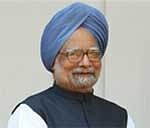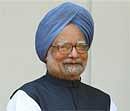

Prime Minister Manmohan Singh on Tuesday admitted that his government was failing in the battle against Maoist extremism, and said Leftwing violence in the affected states continued to be on the rise.
Describing Leftwing extremism as “ the gravest internal security threat” to the nation – the second time he has said so in as many years – Singh made “a frank” admission that not much success has been achieved “to contain the menace”.
Stating that he has been consistently holding Leftwing extremism to be the most serious threat to internal security, Singh said it was a matter of concern that the level of violence in the affected states “continues to rise”. Singh’s observations were made in his address to the three-day annual meeting of state directors-general of police and inspectors-general of police, organised by the Intelligence Bureau, here. The prime minister said dealing with Leftwing extremism required a nuanced strategy and a holistic approach. It cannot be treated simply as a law and order problem.
“Despite its sanguinary nature, the movement manages to retain the support of a section of the tribal communities and the poorest of the poor in many affected areas. It has influence among certain sections of the civil society, the intelligentsia and the youth. It still retains a certain élan. All this adds to the complexity of the problem. I expect you to keep this in mind as you devise newer and better strategies to deal with this problem”, Singh said. He referred to the increasing influence of Maoist rebels in vast swathes of the country. According to Union Home Minister P Chidambaram, they had presence in 18 of the 28 states and were responsible for 90 per cent of the violence in the country.
“I have consistently held that in many ways, Leftwing extremism is, perhaps, the gravest internal security threat our country faces. We have not achieved as much success as we would have liked in containing this menace. It is a matter of concern that despite our efforts, the level of violence in the affected states continues to rise”, Singh said in one of the most candid admissions of the government’s failure in containing Maoist expansion.
While maintaining that levels of violence had come down appreciably in Jammu and Kashmir and was at its lowest level since the beginning of insurgency in the late 1980s, the Prime Minister said there were other worrying signs.
In this content, he cautioned that infiltration across the Line of Control and also via other routes such as Nepal, Bangladesh and the sea was going up.
“Encounters with armed militants have become more frequent in recent weeks and months,” he said.
“Secessionist and militant groups within the state are again attempting to make common cause with outside elements and have embarked on a series of protest movements. The intention apparently is to create an impression of widespread turmoil in the state. We must not allow such a situation to develop. It is imperative that these efforts are contained and checked”, he said.
The situation in the northeastern parts of the country, the Prime Minister warned, was far from satisfactory.
He called for creating “a new-age policeman” who would be more professional, better-motivated, suitably empowered, well-trained, one who placed greater emphasis on technology for investigation and other tasks. “Our police forces must operate on the frontiers of modern technology,” he said.